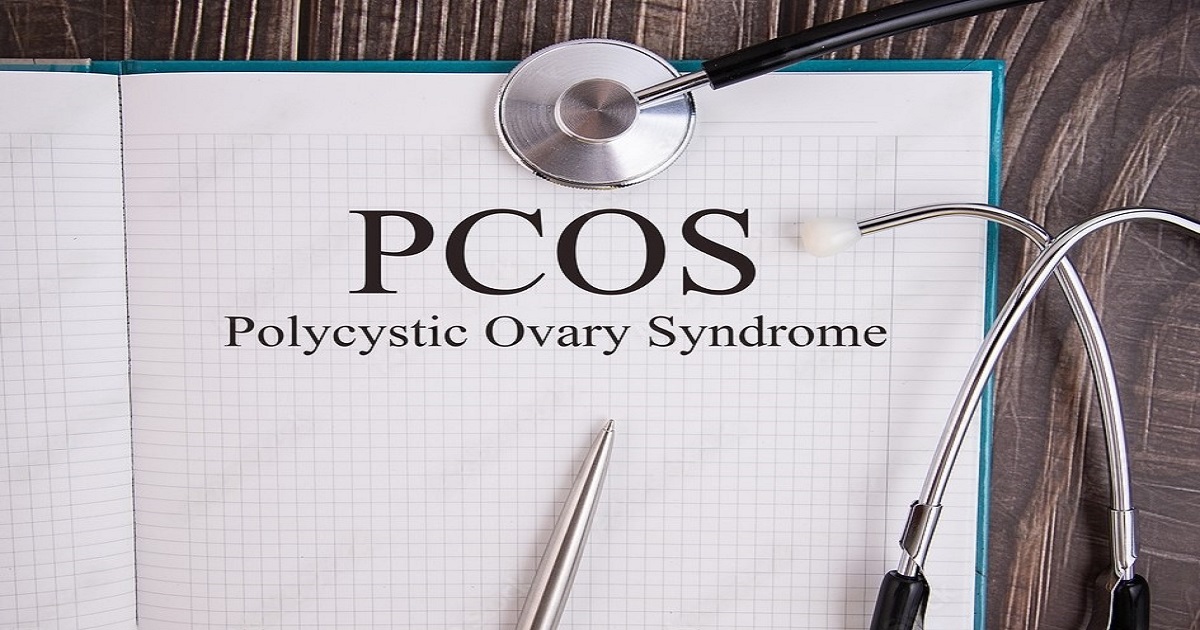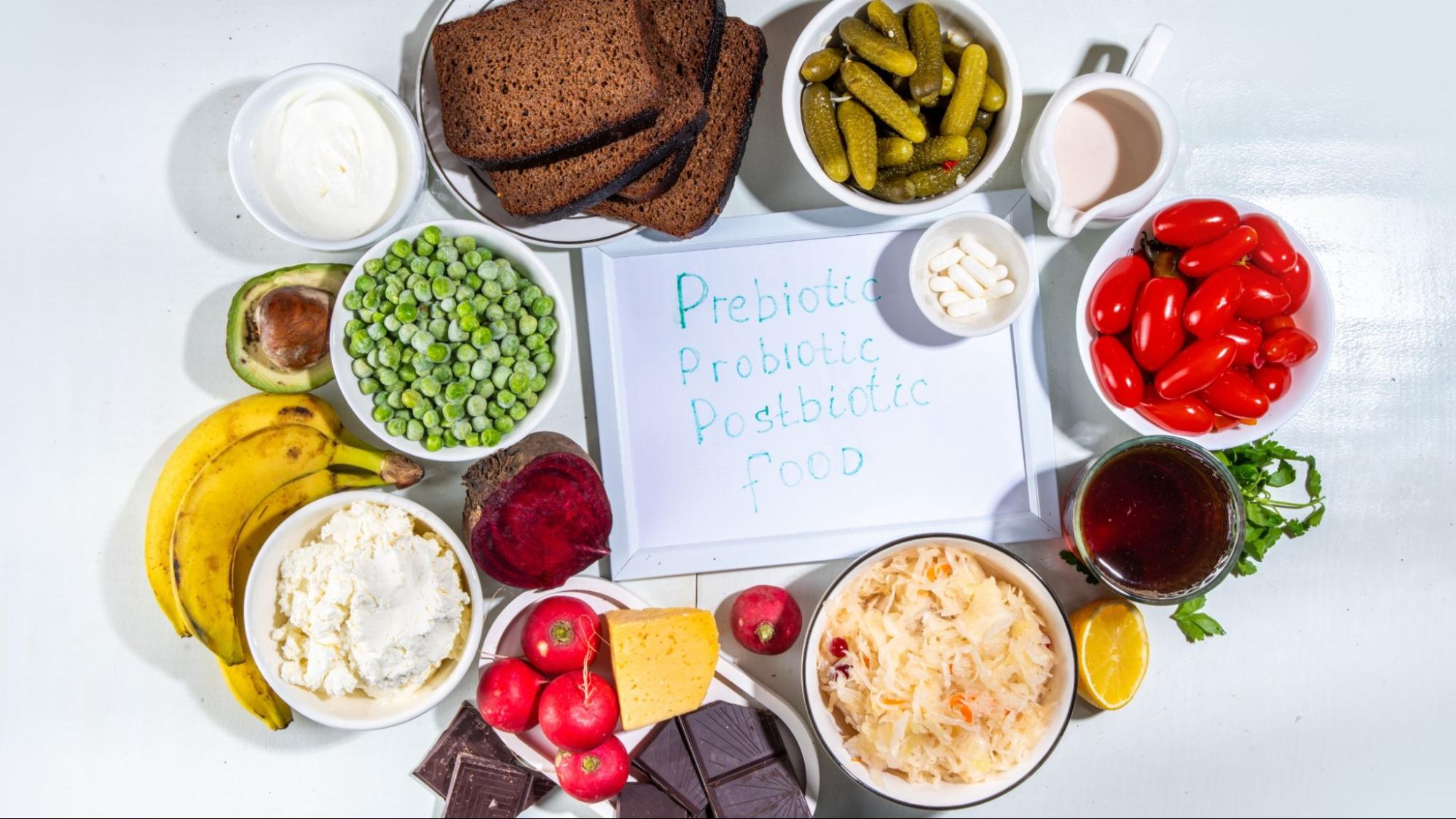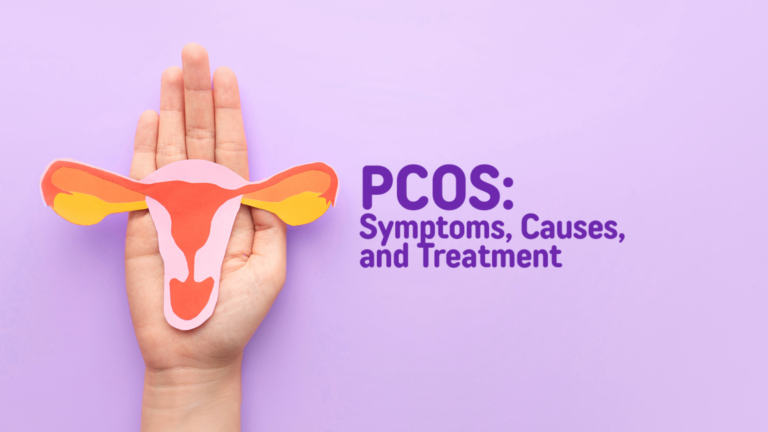Affecting women everywhere, PCOS is a common hormonal condition with a spectrum of physical and psychological symptoms. PCOS has a considerable impact on a woman’s overall well-being, leading to disruptions in menstrual cycles, fluctuations in weight, skin problems, and potential fertility challenges. Though a cure for PCOS has not yet been found, there are many treatment choices available to properly control the symptoms of the disorder and enhance general health. This article explores the typical symptoms of PCOS and offers a thorough examination of different treatment choices, encompassing both natural remedies and medical interventions. It aims to effectively alleviate women’s symptoms by empowering them to regain control of their hormonal balance.
Understand PCOS

PCOS is a hormonal disorder that commonly impacts women during their reproductive years. Here is a detailed overview to help you better understand PCOS:
What is PCOS?
PCOS is a complex endocrine disorder characterised by:
Hormonal imbalance: High levels of androgens (male hormones) and insulin resistance.
Ovarian dysfunction: Cysts on the ovaries, irregular ovulation, and infertility.
Metabolic problems: Insulin resistance, obesity, and an increased risk of diabetes.
Common Symptoms of PCOS:
– Irregular periods or amenorrhea (no periods)
– Weight gain and obesity
– Acne and skin issues
– Excess hair growth (hirsutism)
– Male pattern baldness
– Cysts on the ovaries
– Infertility and difficulty getting pregnant
– Mood swings and depression
– Sleep apnea and fatigue
Causes and Risk Factors in PCOS:
- Genetics: Family history of PCOS
- Hormonal imbalance: High androgen levels, insulin resistance
- Obesity and weight gain
- Environmental factors: Stress, poor diet, lack of exercise
PCOS Diagnosis:
- Physical exam and medical history
- Hormone level tests (androgen, insulin, thyroid)
- Pelvic exam and ultrasound (to detect ovarian cysts)
- Blood tests (to rule out other conditions)
PCOS Treatment Options:
- Lifestyle changes: Healthy diet, regular exercise, weight management
- Medications:
– Hormonal birth control (to regulate periods and reduce androgens)
– Fertility medications (to stimulate ovulation)
– Anti-androgen medications (to reduce excess hair growth, acne)
– Metformin (to improve insulin sensitivity) - Alternative therapies: Acupuncture, herbal supplements, stress management
PCOS Complications:
- Infertility and pregnancy complications
- Insulin resistance and type 2 diabetes
- Cardiovascular disease and high blood pressure
- Mental health issues (depression, anxiety)
Living with PCOS:
- See a doctor should symptoms continue or become worse
- Maintain a healthy lifestyle (diet, exercise, stress management)
- Consider therapy or support groups for emotional support
- Stay informed and advocate for yourself in your healthcare journey.
Natural Treatment and Home Remedies for PCOS
Here are 10 natural treatments and home remedies that may help alleviate PCOS symptoms:
1. Diet Changes for PCOS Symptoms Treatment

Here’s a more detailed explanation of each diet change:
Eat whole, unprocessed foods:
– Focus on vegetables, fruits, whole grains, lean proteins, and healthy fats.
– Include dark leafy greens, berries, citrus fruits, and cruciferous vegetables.
– Opt for healthy grains such as quinoa, brown rice, and whole wheat bread.
– Select lean proteins, including beans, fish, and poultry.
Increase omega-3 fatty acids:
– Find omega-3-rich foods like fatty fish (salmon, sardines, mackerel), flaxseeds, chia seeds, and walnuts.
– Try for 2 to 3 weekly portions of fatty fish.
– Consider an omega-3 supplement if you need more from food sources.
Choose low-carb, high-fiber foods:
– Avoid excessive consumption of refined carbohydrates such as white bread, pasta, and sugary snacks.
– Emphasize the consumption of whole, unprocessed foods that naturally have a low carb content and are fibre-rich.
– Add veggies, fruits, nuts, and seeds to your diet.
Avoid sugar, dairy, and soy:
– Limit added sugars like table sugar, honey, and maple syrup.
– Choose low-lactose or dairy-free substitutes instead of dairy items like milk, cheese, and yoghurt.
– Limit soy products like tofu, soy milk, and soy sauce (or choose fermented soy products like miso and tempeh).
Additional tips:
– Limit sugary beverages and sip plenty of water.
– Cook at home using fresh ingredients to control sugar, salt, and unhealthy fats.
– Read food labels to avoid hidden sugars, artificial additives, and unhealthy ingredients.
– For individual advice, think about seeing a qualified dietitian or nutritionist.
2. Herbal Supplements for PCOS Symptoms Treatment

Here’s a detailed explanation of each herbal supplement:
Saw Palmetto:
– May help reduce androgen levels, alleviating symptoms like excess hair growth, acne, and male pattern baldness.
– May also improve hormone balance and fertility.
– Recommended dosage: 160-320 mg per day.
Chasteberry:
– It may help regulate hormones and improve menstrual cycles, fertility, and overall reproductive health.
– May also alleviate symptoms like bloating, breast tenderness, and mood swings.
– Recommended dosage: 400-1000 mg per day.
Cinnamon:
– May improve insulin sensitivity, reducing the risk of developing insulin resistance and type 2 diabetes.
– May also help lower blood sugar levels and improve glucose metabolism.
– The recommended dosage is 1-2 tsp of cinnamon powder daily or 250-500 mg of cinnamon extract.
Turmeric:
– Has curcumin, a potent anti-inflammatory agent that could assist with joint discomfort, hair loss, acne, and other conditions.
– May also improve antioxidant defences and overall health.
– Recommended dosage: 500-2000 mg of turmeric extract daily, containing at least 95% curcuminoids.
Remember to:
– Before beginning any herbal supplements, mainly if you use drugs or have underlying medical concerns, see a healthcare provider.
– Choose high-quality supplements from reputable manufacturers.
– Follow recommended dosages and monitor your body’s response.
– Combine herbal supplements with a balanced diet and healthy lifestyle for optimal benefits.
3. Home Remedies for PCOS Symptoms Treatment

Here are some detailed explanations for each home remedy:
Apple Cider Vinegar:
– Combine one to two teaspoons of apple cider vinegar with water and drink it before meals to help reduce blood sugar levels and enhance insulin sensitivity.
– It may also help with weight loss and digestion.
For the best results, choose raw, unfiltered apple cider vinegar that contains the “mother.”
Cinnamon Tea:
– Steep 1/2 tsp of cinnamon powder in 1 cup of boiling water for 5-7 minutes.
– Strain and drink 1-2 cups daily to improve insulin sensitivity and lower blood sugar.
– You can add honey or lemon for flavour.
Ginger Tea:
– Infuse 1/2 tsp of fresh ginger in 1 cup of boiling water for 5-7 minutes.
– Strain and drink 1-2 cups daily to reduce inflammation and alleviate symptoms like acne and hair loss.
– Honey or lemon can be included for added flavour.
Castor Oil Packs:
– Apply a warm cloth soaked in castor oil to the lower abdomen for 30-60 minutes.
– These benefits include reducing inflammation, improving digestion, and alleviating symptoms such as bloating and cramps.
– Warm the pack with added benefits using a hot water bottle or heating pad.
Remember to:
– See a doctor before experimenting with new treatments, particularly if you have underlying medical problems.
– Start with small amounts and gradually increase as needed.
– Combine home remedies with a balanced diet and healthy lifestyle for optimal benefits.
4. Ayurvedic Remedies for PCOS Symptoms Treatment
Here’s a detailed breakdown of each Ayurvedic remedy:
Triphala:
– A combination of three herbs: Amalaki, Haritaki, and Bibhitaki
– Regulates hormones, improves menstrual cycles, and supports reproductive health
– May also help with weight management, digestion, and detoxification
– Recommended dosage: 500-1000 mg per day
Amla (Indian Gooseberry):
– High in vitamin C, antioxidants, and minerals
– Improves insulin sensitivity, lowers blood sugar levels, and supports pancreatic health
– May also aid in weight management, digestion, and immune function
– Recommended dosage: 500-1000 mg per day
Shatavari (Asparagus racemosus):
– Regulates hormones, improves menstrual cycles, and supports reproductive health
– May also aid in stress management, anxiety, and mood swings
– Recommended dosage: 500-1000 mg per day
Remember to:
– Consult an Ayurvedic practitioner or healthcare professional before starting Ayurvedic remedies
– Choose high-quality, organic products from reputable manufacturers
– Follow recommended dosages and preparation methods
– Combine Ayurvedic remedies with a balanced diet and healthy lifestyle for optimal benefits
5. Lifestyle Changes for PCOS Symptoms Treatment

Here are some detailed explanations for each lifestyle change:
Exercise Regularly:
– Try to schedule at least 150 minutes a week of moderate-intensity exercise or 75 minutes of vigorous-intensity exercise.
– Include yoga, cardio, and strength training to improve hormone balance, insulin sensitivity, and overall health.
– Start softly and then increase time and intensity.
Stress Management:
– Work on yoga, deep breathing, or meditation to lower tension and anxiety.
– Aim for 10-30 minutes of stress-reducing activities per day.
– Take breaks and prioritise self-care.
Get Enough Sleep:
– Aim for 7 to 8 hours of nightly sleep to regulate hormones and metabolism.
– Create a regular bedtime ritual and sleeping pattern.
– Create a sleep-conducive environment (dark, quiet, relaxed).
Maintain a Healthy Weight:
– Aim for a BMI between 18.5 and 24.9.
– Focus on sustainable weight loss (1-2 pounds per week).
– For best weight control, combine a good diet with consistent exercise.
Remember to:
-Before beginning any new stress-reducing or fitness regimen, see a doctor.
– Listen to your body and rest when needed.
– Change your way of living gradually to guarantee sustainability.
– Combine lifestyle changes with other treatments (diet, supplements, Ayurvedic remedies) for optimal benefits.
6. Acupuncture for PCOS Symptoms Treatment
Here is a more detailed explanation of how acupuncture can help with PCOS:
Improves Hormone Regulation:
– Acupuncture could boost ovulation and help control menstrual cycles.
– It helps hormones control metabolism and the ability for Fertility to be released.
– It can help reduce androgen levels and improve insulin sensitivity.
Enhances Fertility:
– Acupuncture improves ovulation and egg quality.
– It enhances blood circulation to the uterus and ovaries.
– This can be beneficial for reducing stress and promoting Fertility, which can positively affect Fertility.
Reduces Stress:
– Acupuncture can alleviate stress and anxiety by triggering the release of endorphins and other neurotransmitters.
– This has the potential to improve the quality of sleep and help alleviate symptoms of depression.
How Acupuncture Works:
The insertion of thin needles gently stimulates specific points in the body, prompting the release of hormones and other beneficial chemicals.
– It can help restore balance to the body’s energy, or “qi”.
– Typically involves 6-12 sessions, with maintenance sessions as needed.
Remember to:
– Find a licensed and experienced acupuncturist.
– Discuss your PCOS symptoms and medical history with your acupuncturist.
– Combine acupuncture with other treatments (diet, supplements, lifestyle changes) for optimal benefits.
7. Probiotics for PCOS

How probiotics can help with PCOS:
Improving Gut Health:
– Probiotics help restore the balance of gut bacteria.
– They improve digestion, reducing symptoms of IBS such as bloating, cramps, and diarrhoea.
– Probiotics have been found to impact inflammation and positively contribute to better gut health.
Regulating Hormones:
– The gut-brain axis may be helped to be regulated by probiotics, therefore enhancing hormone balance.
– They also help reduce androgen levels and improve insulin sensitivity.
– Probiotics may also help regulate menstrual cycles and improve fertility.
Boosting Immune System:
– Probiotics support the immune system by increasing the production of antibodies.
– They help reduce inflammation and improve overall immune function.
– Probiotics may also help reduce the risk of infections and autoimmune diseases.
Best Probiotics for PCOS:
– Look for probiotics with multiple strains (Lactobacillus, Bifidobacterium, Streptococcus).
– Choose probiotics with a high CFU (colony-forming unit) count.
– Consider probiotics specifically formulated for women’s health or PCOS.
Remember to:
– It is advisable to seek guidance from a healthcare professional before commencing probiotics.
– Start with a small dose and gradually increase as needed.
– Combine probiotics with other treatments (diet, supplements, lifestyle changes) for optimal benefits.
8. Omega-3 Fatty Acids for PCOS

Here is a more detailed explanation of how omega-3 fatty acids can help with PCOS:
Reduces Inflammation:
– Omega-3s, particularly EPA and DHA, have potent anti-inflammatory effects.
– They may help lower bodily inflammation, therefore improving PCOS symptoms.
– They may also help reduce the risk of chronic diseases like heart disease and diabetes.
Improves Hormone Regulation:
– Omega-3s can help regulate hormone production and balance.
– They may improve insulin sensitivity and reduce androgen levels.
– They may also help control menstrual cycles and increase Fertility.
Enhances Fertility:
– Omega-3s can help improve egg quality and ovulation.
– They may increase the chances of conception and reduce the risk of miscarriage.
– They can also help improve sperm quality and motility.
Best Sources of Omega-3s:
– Fatty fish (salmon, sardines, mackerel)
– Flaxseeds and chia seeds
– Walnuts and other nuts
– Omega-3 supplements (fish oil, krill oil)
Remember to:
– See a doctor before beginning omega-3 supplements.
– Choose high-quality supplements with sufficient EPA and DHA content.
– Combine omega-3s with other treatments (diet, probiotics, lifestyle changes) for optimal benefits.
9. Vitamin D

Managing PCOS depends on vitamin D significantly. Here is a thorough list of the ways it could help you:
Hormone Regulation:
– Vitamin D helps regulate hormone production and balance, potentially improving menstrual cycles and reducing the risk of hormonal imbalances. It can also regulate thyroid function.
Improved Insulin Sensitivity:
– Improved insulin sensitivity brought about by vitamin D has been linked to help lower the risk of type 2 diabetes and insulin resistance development. It also has anti-inflammatory effects and aids in glucose metabolism.
Enhanced Immune System:
Vitamin D regulates the immune system. It can potentially
Hormone Regulation:
– Maca helps balance estrogen, progesterone, and testosterone levels
– It can reduce androgen levels and improve insulin sensitivity
– May also regulate menstrual cycles and improve ovulation
Fertility Improvement:
– Maca can enhance egg quality and ovulation
– It may increase the likelihood of conception and reduce the risk of miscarriage
– Also, it can improve sperm quality and motility
Energy Enhancement:
– Renowned for its adaptogenic qualities, maca helps control stress and raises energy levels.
– It helps reduce fatigue and improve mental clarity
– It may also improve mood and alleviate symptoms of depression and anxiety
The Best Way to Consume Maca:
– Choose a high-quality Maca supplement or powder
– Begin with a small dose of 1/2 teaspoon and adjust accordingly as needed.
– Add it to smoothies and soups, or take it as a supplement
Remember to:
– Consult a healthcare professional before using Maca, particularly if you are taking medications or have underlying health conditions
– Combine Maca with other treatments (diet, probiotics, omega-3s) for optimal benefits
– Monitor your body’s response and adjust your dosage accordingly
Conclusion
Living with PCOS can be a difficult journey, but it’s manageable. With a clear understanding of the symptoms and treatment options, women can confidently take control of their condition and enhance their overall well-being. There are various methods available to help manage the symptoms of PCOS and restore hormonal balance, including lifestyle adjustments, natural remedies, and medical treatments. As a friendly reminder, you have a supportive community throughout your journey with PCOS. You can conquer the obstacles of PCOS and lead a life that is healthy, joyful, and satisfying with the appropriate treatment and support.

